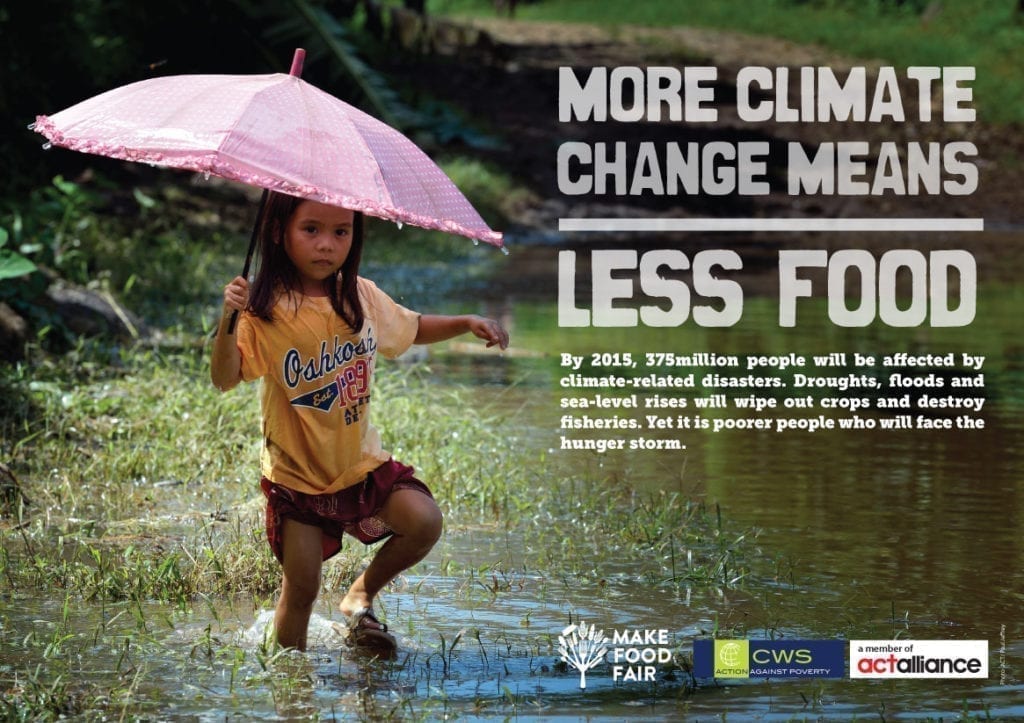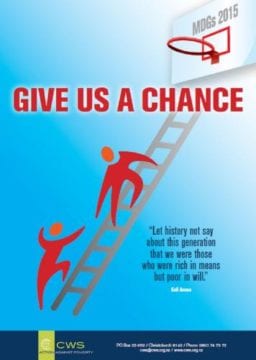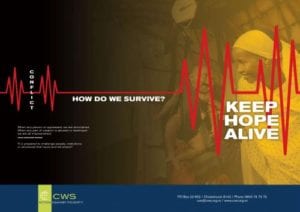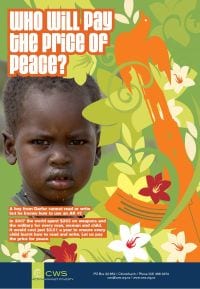CWS’s posters get young people talking about global issues. Designed for youth leaders to use with groups aged 12-18 years. Fun A2 image on one side, with games, activities, discussion starters, quizzes and worship material on the other. Easy to photocopy as A4 if needed.
Join the mailing list to receive your FREE copy.

YT 19: More Climate Change means less Food
By 2015, 375 million people will be affected by climate-related disasters. Droughts, floods, sea level rises will wipe out crops and destroy fisheries. Yet it is the poorer people will face the storm. Explore the issues in depth.
Youth Topics Poster Image
Youth Topics Activities
YT 18: What Controls the Global Menu?
Food is a basic human right but in 2010 925 million did not get enough to eat. The surprise – 80% were food producers. The poorest people are finding it hard to survive and are moving to the cities in the hope of work. There are growing calls for food sovereignty among poor people who can see how large scale factory farming and the immense power of transnational corporations are robbing them of their livelihoods. This Youth Topics explores how we get our food and why people are hungry.
YT 18 Poster and Activities

YT 17: Give us a Chance
Our world enjoys more widespread prosperity than ever before yet millions of people remain trapped in poverty. The Millennium Development Goals (MDGs) agreed to by world leaders in 2000 provide measurable targets to halve poverty and hunger by 2015. But has the world got the political will to meet them? This Youth Topics focuses on the MDGs and how they can eradicate poverty.
YT 17 Poster YT 17 Activities
>>Resource for Activity 1 and 5. Download a copy of the MDGs
YT 16: Are you free tonight?
This issue of Youth Topics looks at some of the issues around political and religious freedoms. In particular it asks young people to explore some heroes who have stood up for these rights or freedoms and encourages them to think about the need to protect freedom. It explores the ways people earn freedom, the barriers put in place to freedom and the place of superheroes.
YT Poster YT 16 Activities

YT 15: Keep hope alive
Greed, racism, violence, discrimination and inequality all trigger devastating cycles of conflict. Yet somehow people survive and keep hope their hopes for a better future alive. This issue of Youth Topics examines what peacemakers do at the grass roots level – the courageous, determined people working tirelessly to help those in need and resolve the differences at the heart of conflict in their communities.
YT 15 Poster YT 15 Activities
>>Resources for activity 5: What can help! a:words b:definitions c:word find

YT 14: Who will pay the price of peace?
A young man from Darfur cannot read or write but he knows how to use an AK 47. In 2007 the world spent $262 for every man, woman and child on weapons and the military. It would cost just $2.01 a year to ensure every child learnt how to read and write. Let us pay the price for peace.
This issue of Youth Topics looks at some of the causes of conflict in our lives and the world. It explores the cost of war and some efforts towards conflict resolution and the difficulties of making peace where there is war. YT 14 posterYT 14 activities
YT 13: Engaged?
2.6 billion people do not have access to clean, safe and adequate sanitation. This issue of Youth Topics explores some of the problems around water and sanitation. Looking at water-borne diseases, access to clean water and how where you live affects your level of sanitation.
YT 12: Climate Change, What does it matter?
“A child born in a wealthy country is likely to consume, waste, and pollute more in his/her lifetime than 50 children born in developing nations. Our energy-burning lifestyles are pushing our planet to the point of no return,” says George Carey, former Archbishop of Canterbury. This Youth Topics examines climate change and what we can do to make a real difference.
YT 11: Down the Gurgler?
Although 70% of the world’s surface is covered by water, only 2.5% is fresh water and less than 1% is accessible for human use. Water is a necessity for life and a resource to be protected from exploitation. People in developed countries on average consume 10 times more water daily than those in developing countries. According to the UN Enivronment Programme the average person in developed countries uses 500-800 litres per day, compared to60-150 litres per day in developing countries.
YT 10: Absent from School?
Right now over 115 million children wake up everyday, without the opportunities education offers. Many of these children are already in work, often exploitative conditions with little hope of escape.

YT 9: Do your clothes sweat?
A skilled worker in a Sri Lankan garment factory works 223 hours a month in sweatshop conditions and receives 30 cents an hour. WHY? Learn more about the global garment industry and what we can do about it here in New Zealand!
T 8: Earthquakes, Wars, Tsunamis.
96 out of every 100 people who die as a result of a natural disaster lived in the poorest countries…Why? features where and what disasters happen in our world, a disaster quiz and an interview with a young hurricane survivor in Nicaragua.
YT 7: Sweet as?
Chocolate; sweet as, right? Not if you grow the cocoa. While we experience chocolate as delicious it can be a very bitter experience for people who farm cocoa and live in poverty. Learn about the dark side of chocolate and discover how chocoholics can work for sweet justice. Activities include: A chocolate Quiz. How much do you know about this delicacy? Are you a chocoholic? Reflect on the factors that influence our chocolate decisions. Chocolate destroys rainforests: Learn about the connection between chocolate and the rainforests of Malaysia.
YT 6: Don’t dump on me!
New Zealanders use over 22 million plastic bags every week. Each plastic bag takes 500 years to break down. Every month New Zealanders throw out enough rubbish to fill a football field 30 storeys high. This rubbish ends up in landfills affecting the environment in Aotearoa and people in other countries through global warming. Features Bye bye Tuvalu? Guess the contribution of different countries to global warming – which is threatening to wipe out Pacific nations, Taking action for the environment: how one group is fighting to protect its drinking water and a Waste log: What is YOUR impact on the environment?
YT 5: Hungry?
Everyday 840 million people go hungry. Every 3.5 seconds someone, somewhere dies from hunger. This isn’t a headline grabbing famine. This is the day to day reality for 1 in 7 of the world’s people. Globally there is enough food for everyone. We just need to learn how to share it. Activities include: make it, move it, eat it! Guess the food and where it comes from,food facts: Fact or fiction? Food security role play: what would you do if all the food shops were closed for a week? If the world’s big banks decided all New Zealand’s farms had to grow tobacco or tulips instead of food for local people?
YT 4: “What’s brewing?”
in the coffee industry? Coffee, after oil, is the most traded commodity in the world. Yet millions of people in developing countries who grow and pick coffee are facing poverty and starvation. This Youth Topics illustrates how current trade practices exploit the world’s poorest people, those who grow and pick the coffee beans. We choose to change this and hope you do too.
YT 3: I was a stranger and you welcomed me….
focuses on the plight of refugees. It looks at the causes of refugee crises, what happens to refugees and what we can do to help.
YT 2: Give Child Labour the Red Card!
Highlights the experience of children who stitch soccer balls in India and Pakistan.
YT 1: – JUSTice Do It!
Looks at who are the real winners and losers of the sports shoe trade.

